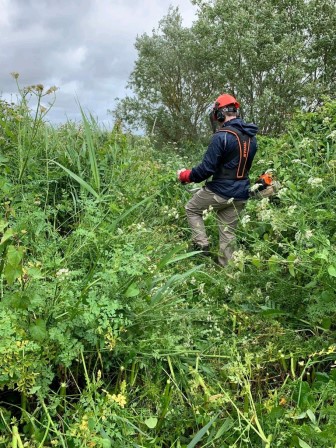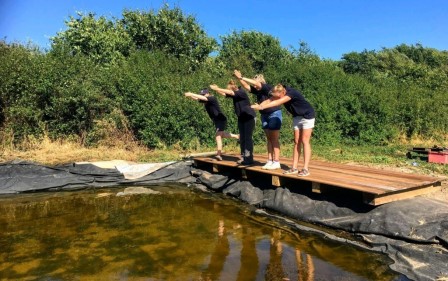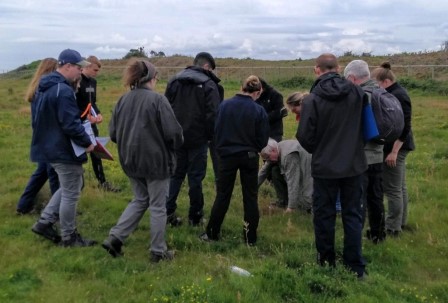Land Based Colleges; Increasing Access to Skills and Experience within the Conservation Sector
This post is greater than 6 months old - links may be broken or out of date. Proceed with caution!

Brian Heppenstall, Course Manager Level 3, Wildlife, Ecology and Conservation at Kingston Maurward College, Dorchester.
I have recently moved to teach Wildlife Conservation as a subject at a land-based college, having previously held a Senior Ranger role for the past 11 years, during which time I developed a nationally recognised work placement programme for students from both further and higher education.

Prior to this programme, I was hosting - unpaid “internships”, which would offer experience and some qualifications (usually Lantra Chainsaw certificate & an in-house brushcutter/chippers certificates) in-return for 6 to 12 months of the person’s time. There were no minimum requirements for candidates to apply for this scheme, but applicants often had degrees (sometimes up to MSc) and these higher qualified candidates were often offered the unpaid roles. One day, one of our interns pointed out to me they felt uneasy at the type of work and responsibility they were being given - as it felt like something someone should be paid for doing it - and they were right. The candidates were running activities and events, which we were charging people to attend, and they were also carrying out essential day-to-day operational work, sometimes unsupervised. In many situations, there was no discernible difference in terms of responsibility, qualifications and competence between the unpaid staff and paid staff - apart from the pay itself.
In most cases, unpaid internships such as that I have described - are illegal in the UK, there are some exemptions to this, one of these would be if the opportunity was linked to a full-time course (I differentiate by terming these as placements), another exemption is if the opportunity is based with a charity, or not-for-profit organisation. The latter leaves the door open for most of the UK conservation sector to continue to offer roles that would be illegal in most other sectors.

Having established that unpaid placements are still legal in conservation in most circumstances - let’s consider the moral implications. Research carried out in 2018 by the Sutton Trust, revealed that the average cost of an unpaid internship, to the person undertaking it, is around £1000 - dependent on where in the UK it is based (Sutton Trust, 2018). We have always had plenty of applicants for unpaid internships, but we should ask ourselves; “who cannot afford to commit to unpaid roles”. We should not shrug this question away, in 2021 there exist entry-level roles within conservation (salaried at between £17k-£19k per annum), which ask for both qualifications in Countryside related disciplines, Certificates of Competence in Machinery Use (brushcutter/chainsaw etc) and also experience - all three of these requirements require financial resources or sacrifices, considering that the experience prior to an entry-level post, seems most likely to come from unpaid work.
The resulting effect of high requirements in entry level roles, is to limiting candidates that can realistically meet them. For example; those from lower socioeconomic backgrounds, different ethnicities (Southby, South and Bagnall, 2019) and also applicants who may have commitments for which 6 to 12 months of unpaid work is unfeasible (mortgages, dependants etc). It is no surprise therefore, that a Government mandated review into modern working practices, highlighted that unpaid internships hindered social mobility, thereby limiting diversity (Taylor. M, 2017).
Volunteering has been a long held tradition of the Conservation sector, and there is no shame in this. Vital work is carried out on nature reserves, in visitor centres or the back offices of conservation organisations, for philanthropic reasons, for wildlife itself and for direct benefits to the physical and mental health of those volunteers - this is not the type of volunteering that is raising concerns, nor is it the subject of this article. When we ask graduates of further and higher education to carry out long-term unpaid placements with the unguaranteed lure of future paid positions within the sector, then we should return to the moral questions raised by both the Sutton Trust and Taylor research - are we risking exclusion, or exploitation?

In my experience, switching from an internship scheme (attracting graduates) to building a quality placement scheme, linked to education - is a subtle change, but a critical one for the candidate. Experience provided at this stage can help a student to decide their career pathway, and as an employer, you will be in a position to spot and encourage potential, helping to develop the future workforce.
Colleges and Universities should make the most of opportunities to work closely with industry in order to offer the most relevant and applicable knowledge, skills and techniques - cutting down the requirement for further experience upon graduating. As a new teacher, I will be developing a “graduate profile” in consultation with local employers - to identify what skills, knowledge and behaviours students will need to be successful in their careers, to be updated annually.
I firmly believe that if we end unpaid internships, we will start to become a more inclusive and fair sector. Organisations could also consider developing inclusive work experience programmes for secondary school students alongside those for further/higher education students, this can provide opportunities for candidates to better understand the pathway(s) into the sectors, how they can make the most of their time and college/university and what skills to develop.
Reducing the volunteering expectation for entry roles is likely to increase inclusion and lead to a more relatable and more diverse conservation workforce - which in itself can lead to a more productive workforce (Saxena, 2014).
References.
Saxena, A. (2014). Workforce Diversity: A Key to Improve Productivity. Procedia Economics and Finance, 11, pp.76–85.
Southby, K., South, J. and Bagnall, A.-M. (2019). A Rapid Review of Barriers to Volunteering for Potentially Disadvantaged Groups and Implications for Health Inequalities. VOLUNTAS: International Journal of Voluntary and Nonprofit Organizations, 30(5), pp.907–920.
Sutton Trust. (2018). Unpaid, Unadvertised, Unfair. [online] Available at: https://www.suttontrust.com/our-research/internships-unpaid-unadvertised-unfair/ [Accessed 28 Mar. 2021].
Taylor, M. (2017). Good Work; The Taylor Review of Modern Working Practices. Available at: https://c-js.co.uk/3hywOjc
Frances Jenkins, Head of Careers at Kingston Maurward College, Dorchester.
The introduction of T-Levels in 2020[1] has seen a renewed focus placed on young people gaining occupationally-relevant experience in the workplace. A mandatory part of a T-Level qualification is a high quality substantial industry placement, essentially a minimum of 315 hours in the workplace, external to the student’s place of study, completed over one or two academic years.
With a longer duration, industry placements allow students a sufficient amount of time in the workplace to get a real understanding of what life is like working in that industry.
For sectors like Countryside and Agriculture, students gain experience throughout the seasons, each with their own unique changes and challenges.

Employers are able to invest time and resources into training placement students safe in the knowledge that the student will remain on placement with them for a minimum of one academic year.
In comparison, work placements in Higher Education tend to be much shorter, 2 or 3 week blocks at one point in the academic year. Students are expected to gather evidence of completing their placement more independently, it varies per institution how closely monitored or regulated placements are.
For FE colleges that are/will be delivering T-Levels, all industry placements must be regularly monitored with robust procedures in place to ensure each placements is truly meaningful and will add value to the student’s learning experience.
At Kingston Maurward, placements are supported by a variety of college staff including an Industry Lead, the student Services Team, course managers and Heads of Department.
Students with SEND are fully supported to secure and complete placements ensuring that employers have advice and guidance necessary to facilitate a meaningful experience.
Students are required to complete reflective logs throughout their placement, identifying their skills and strengths but also acknowledging their development areas and setting individual goals. This echoes the appraisal process adopted in the workplace preparing students for this aspect of working life.
Student performance on placement is regularly reviewed against a specific set of assessment areas divided into 2 categories; Behaviour & social skills and Industry knowledge & technical skills. The assessment areas reflect what employers have highlighted to be ‘most wanted’ within industry.
Although placements may often begin unpaid, many students are offered part-time paid work as a result of their performance on placement.
Conversely part time work that the student already has may also be included towards industry placement hours, as long as the industry in which the student is working is clearly linked to the course that they are studying.
[1] https://www.gov.uk/government/publications/introduction-of-t-levels/introduction-of-t-levels
More from Kingston Maurward College